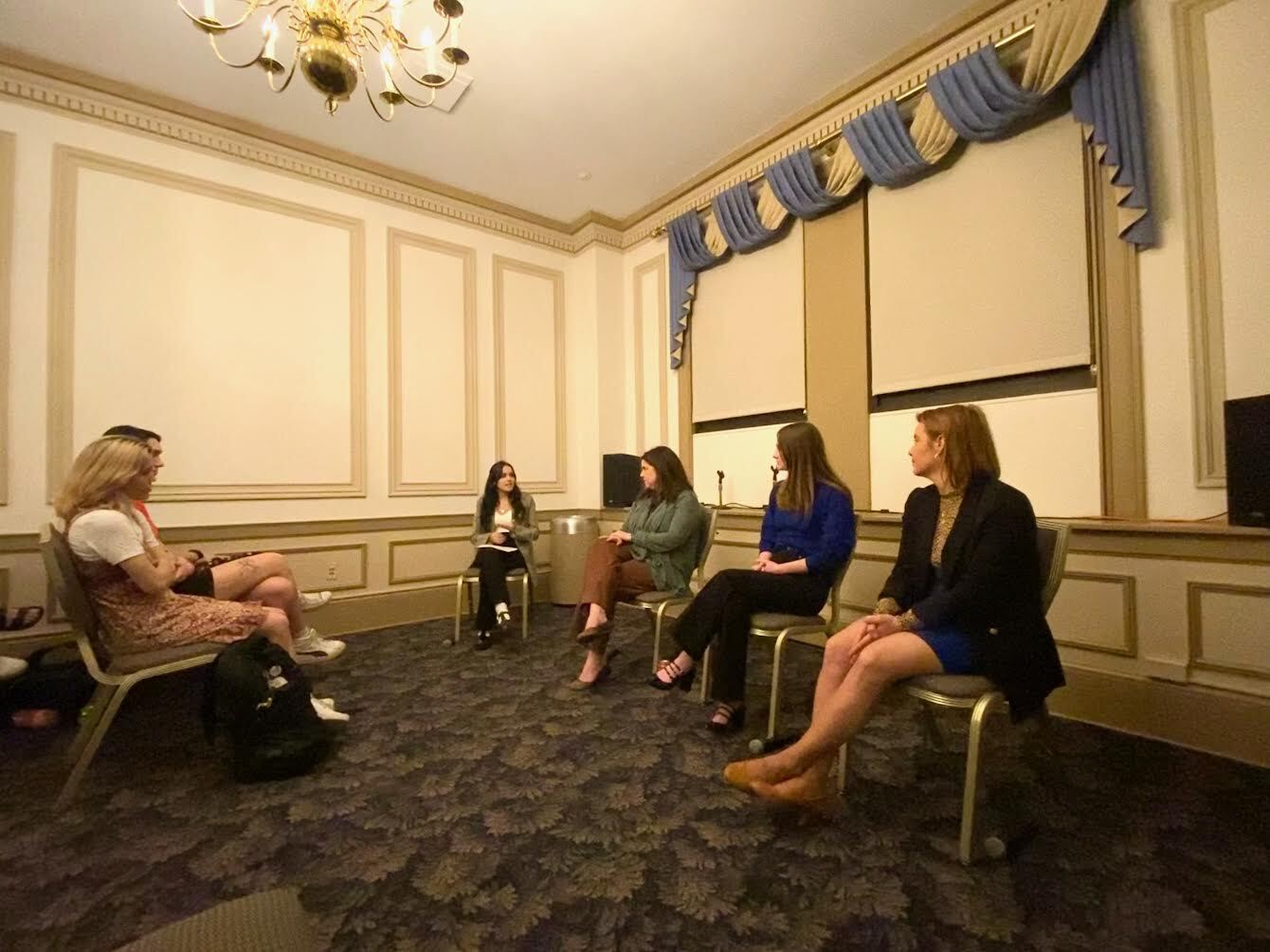SGB hosts Women in Politics panel


Panelists speak during a Women in Politics event hosted by Student Government Board on Monday in the William Pitt Union.
In celebration of Women’s History Month, Student Government Board hosted a Women in Politics panel on March 4 featuring a panel of women involved in politics. During the event, the panelists shared insights into their political work, discussing their entry into the field and the ways their career has been shaped as a woman.
Panel moderator Kristin Kanthak, an associate professor of political science at Pitt, remembered how her childhood shaped her career.
“I come from a family where politics was a sport and we would debate issues and I kind of took it to a whole new level,” Kanthak said. “I decided to go to graduate school for political science.”
Meanwhile, senior politics and philosophy major Hattie Lindsey mentioned how the differing views she saw growing up in Fayette County encouraged her to find groups and organizations she aligned with.
“I believe it’s one of the most Republican counties in the entire state,” Lindsey said. “For me, not necessarily aligning with that, it was always a bit of a struggle with my political beliefs compared to my peers. I think that initially sparked my interest in just kind of seeing those divisions. As I got into high school, I got involved with a program locally called Girl Up where I really found a community of like-minded people who wanted to do good for others.”
While Lindsey got her political start through high school, Madi Pryor, executive director of South West Regional Chamber of Commerce, was originally involved with magazine writing and film before moving to Pittsburgh.
After moving, Pryor said she fell into her role after her involvement with the Chamber of Commerce candidates in her marketing job.
“I went out to the network for a chamber event and sat down with the board of directors. A few months later, they said, ‘The executive director position is opening and we think you should interview,’” Pryor said.
For students looking for political internships and opportunities such as the Chamber, Kanthak said one of the biggest things students can do is expand their definition of politics and get involved in grassroots work.
“We do a lot of community engagement work in Fayette County and talk about how Pitt can partner with Fayette to make the country better,” Kanthak said. “90% of the people in these rooms are small business owners. These people are having a real positive effect on their communities. If you’re willing to put in the work, you can make a lot of changes.”
From her research at Pitt, Kanthak said there can be barriers preventing women from becoming involved with politics.
“We did an experiment where we had a math task and said ‘We’ll pay you a quarter for every math problem you did right.’ We then said, ‘We’re going to experiment again, but this time, you’re going to be paid based on a representative from your group,’ and asked if they’re willing to be the volunteer for the group,’” Kanthak said. “Women didn’t do it, and it did not matter how good they were at the task.”
To get women to run for office, Kanthak said it’s important to turn something into a volunteer activity instead of a competitive activity and look for role models.
“You don’t even have to win to have an effect when you’re running for office or doing anything else,” Kanthak said.
Lindsey, previous president of Pitt’s Mock Trial team, reflected on gaining confidence to run for the position.
“I ran with some of my best friends at the time, and that was helpful,” Lindsey said. “Even if you have an idea that you want to run for something that you’re nervous about, it helps to talk to your friends and they will likely encourage you because they’ll see how qualified you are for that position.”
When interning for former Representative Connor Lamb, Lindsey said she noticed women worked in the office, but men took many of the high positions.
“It was interesting to see women occupying some of these lower roles in that hierarchy and not necessarily being in the top chain of the office,” Lindsey said. “I think where I felt it the most is with the dynamic with the interns.”
Working with another woman and two male colleagues, Lindsey said she could see a disparity between how the male interns interacted with each other and treated their work.
“We noticed we were picking up a lot more calls, and taking some projects a lot more seriously,” Lindsey said. “The male interns would sort of leave the office and go on these walks around the Capitol and leave with the work like taking phone calls.”
In her recent political work, Lindsey said she noticed her direct managers have all been women, and noted that she believes it has been good to have women in charge as mentors.
“Having more women at the table, and women working there in roles of leadership, is a really important thing,” Lindsey said.
Recent Posts
Porch roof collapse injures dozens during party on Semple Street
The roof of a porch on Semple Street collapsed during a St. Patrick’s Day celebration…
A Good Hill to Die On // Break It Down
In this release of “A Good Hill to Die On,” I dive deep into the…
Who Asked? // Does growth only “count” if it’s quantifiable?
This installment of Who Asked? by staff writer Brynn Murawski wonders why it feels like…
“They’re throwing trans people under the bus”: Counseling center faces backlash after event name change
On Feb. 24, Pitt’s Counseling Center faced backlash after briefly renaming an event from "LGBT…
Q&A: Meet the 2024-2025 SGB president and vice president
SGB announced the 2024-2025 election results at their meeting on Tuesday. The Pitt News spoke…
Editorial | Pitt Administration must listen to its students’ electoral demands
The passing of these referendums does not guarantee a future Pitt with these policies. Merely,…

